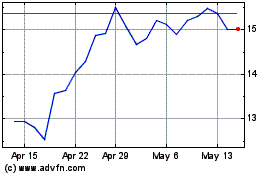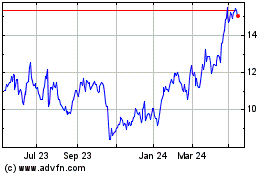RefleXion and Telix Pharmaceuticals Announce Strategic Collaboration for Treatment of High-Risk Cancers
July 08 2020 - 10:00AM
Business Wire
RefleXion Medical, a therapeutic oncology company pioneering
biology-guided radiotherapy* (BgRT) as a new modality for treating
all stages of cancer, and Telix Pharmaceuticals Limited (ASX: TLX),
a radiopharmaceutical company developing molecularly-targeted
radiation (MTR) products, today announced a strategic collaboration
to investigate the clinical utility of combining the companies’
technologies to improve treatment for high-risk or recurrent
prostate and aggressive kidney cancers.
This press release features multimedia. View
the full release here:
https://www.businesswire.com/news/home/20200708005111/en/
Under the agreement, the parties will evaluate several new
positron emission tomography (PET) tracers, including 68Ga-PSMA-11
for prostate cancer and 89Zr-Girentuximab for kidney cancer1, to
evaluate their potential in guiding BgRT to treat disease.
“The Telix tracers show considerable potential for detecting
metastatic disease,” said Phuoc Tran, M.D., Ph.D., professor of
radiation oncology and molecular radiation sciences, oncology and
urology at the Johns Hopkins School of Medicine. “Combining them
with RefleXion’s BgRT, which is designed to treat metastatic
disease, could bring us a step closer to improving outcomes for
these cancer types.”
BgRT uses biological emissions from a patient’s cancer cells
created by injecting a small amount of a targeting molecule
carrying a positron-emitting radioisotope known as a PET tracer to
guide external-beam radiotherapy (EBRT). As the PET tracer binds to
the tumor cells, it produces emissions that signal the cancer’s
location. The RefleXion™ X1 machine detects these emissions using
PET detectors and responds in real-time to direct BgRT to each
tumor and destroy it, even in moving tumors. The most commonly used
PET tracer is 18F-fluorodeoxyglucose (FDG), which can detect many
different cancer types. However, its performance in certain tumor
types and organs remains limited, particularly for kidney and
prostate cancers. Telix’s new PET tracers are designed to target
specific cancer types and are expected to be more accurate in this
clinical setting.
“Telix’s cancer-specific PET tracers may provide a more complete
and robust signal to guide BgRT for difficult-to-treat cancers of
the prostate and kidney,” said Thorsten Melcher, Ph.D., chief
business officer at RefleXion. “This collaboration is an important
step in providing proof-of-concept that PET-based tumor emissions
can guide our BgRT using different tracers and in different cancer
types.”
Prostate specific membrane antigen (PSMA) imaging with
68Ga-PSMA-11 is suited for imaging high-risk or recurrent prostate
cancer due to its ability to detect the spread of cancer outside
the prostate bed. PSMA imaging is emerging as a potential new
standard of care for detecting and staging prostate cancer, subject
to approval by regulators2. For renal cancer applications, Telix’s
89Zr-Girentuximab, the first zirconium-labeled PET tracer in
late-stage clinical development, targets carbonic anhydrase IX
(CA9), an antigen that may differentiate renal cancer, including
metastases, from benign disease.
“The use of Telix’s cancer-specific PET tracers may enable us to
guide RefleXion’s BgRT in patients with more advanced forms of
prostate and kidney cancer,” said Christian Behrenbruch, Ph.D., CEO
at Telix. “This collaboration also allows us to leverage the
investment we’ve made in these tracers by expanding both their
indications and overall procedure volumes.”
About RefleXion Medical
RefleXion is a privately-held therapeutic oncology company
developing the first biology-guided radiotherapy (BgRT) machine, a
significant change in strategy from single tumor therapy to the
ability to one day treat multiple tumors in the same treatment
session in cancers that have metastasized. Currently, the RefleXion
machine is cleared for the delivery of stereotactic body
radiotherapy (SBRT), stereotactic radiosurgery (SRS) and intensity
modulated radiotherapy (IMRT), all different techniques of EBRT.
The company is also developing BgRT, which incorporates
positron-emission tomography (PET) data to enable tumors to
continuously signal their location. The BgRT technology will
synchronize these data with the linear accelerator to direct
radiotherapy to tumors with sub-second latency.
About Telix Pharmaceuticals Limited
Telix is a clinical-stage biopharmaceutical company focused on
the development of diagnostic and therapeutic products using
Molecularly Targeted Radiation (MTR). Telix is headquartered in
Melbourne, Australia, with international operations in Belgium,
Japan and the United States. Telix is developing a portfolio of
clinical-stage oncology products that address a significant unmet
medical need in prostate, renal and brain cancer. Telix is listed
on the Australian Securities Exchange (ASX: TLX). For more
information, visit www.telixpharma.com.
*The RefleXion X1 BgRT capability requires 510(k)
clearance; this feature is not available for sale.
1 Ga-PSMA-11 and 89Zr-Girentuximab are available for
investigational use under an FDA Investigational New Drug (IND)
application. Neither imaging agent has a marketing authorization in
any jurisdiction.
2 Trabulsi EJ, et al. Optimum Imaging Strategies for Advanced
Prostate Cancer; ASCO Guideline. J Clin Oncol 38: 1963 – 1996
(published online January 15, 2020).
View source
version on businesswire.com: https://www.businesswire.com/news/home/20200708005111/en/
RefleXion Media Contact: Amy Cook acook@reflexion.com
Media Resources
Telix Media Contact: Dr. David N. Cade Chief Business
Officer david.cade@telixpharma.com
Telix Pharmaceuticals (ASX:TLX)
Historical Stock Chart
From Jan 2025 to Feb 2025

Telix Pharmaceuticals (ASX:TLX)
Historical Stock Chart
From Feb 2024 to Feb 2025
